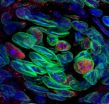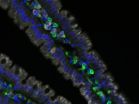Body mass index and risk of death in Chinese population
2011-03-08
(Press-News.org) Chinese people with a body mass index (BMI) of 24-25.9 had the lowest risk of death, according to a study published in CMAJ (Canadian Medical Association Journal) (pre-embargo link only) http://www.cmaj.ca/embargo/cmaj101303.pdf
Obesity has increased significantly across the globe and the World Health Organization (WHO) estimates that about 2.3 billion adults will be overweight and more than 700 million will be obese by 2015. Overweight and obesity are associated with increased risks of heart disease, diabetes, cancer and other chronic diseases.
As white populations have served as the benchmark for definitions of overweight and obesity, the WHO has suggested a lower cut-off for overweight and obesity in Chinese populations.
This study, by researchers from Taiwan and the US, looked at 58 738 Chinese men and 65 718 women in Taiwan aged 20 or older to find the association between BMI and risk of death from any cause. They found that people with a BMI of less than 24 with a chronic disease were at higher risk than those without a chronic disease. Smokers with lower BMIs had a higher risk of death. People with a chronic disease and a higher BMI (above 30) had a lower risk of death.
The lowest risk of death was among men and women with a BMI of 24-25.9, compared with white populations in which the lowest risk has been reported among people with a BMI of 22.5-24.9.
"The risk of death was higher among people with BMIs in the lower and upper categories than among those with BMIs in the middle category," writes Dr. Wen-Yuan Lin, China Medical University, Taichung, Taiwan, with coauthors.
"The findings from our primary analysis and sensitivity analyses are consistent with the results of [other] studies and do not support the use of a lower BMI cutoff value for overweight and obesity in the adult Chinese population," state the authors.
In a related commentary http://www.cmaj.ca/embargo/cmaj110142.pdf , Dr. Shankuan Zhu, Zhejiang University, Hangzhou, China, and coauthors write "the findings in the study by Lin and colleagues are important because they seem to challenge the current definitions of overweight and obesity and are inconsistent with the pattern found in white populations and for the relation between BMI and chronic diseases, in particular cardiovascular diseases."
INFORMATION: END
ELSE PRESS RELEASES FROM THIS DATE:
2011-03-08
Stroke patients who also suffer from an irregular heartbeat are at double the risk of developing dementia, according to a new study by the University of East Anglia (UEA).
Published tomorrow in the journal Neurology, the findings show that stroke survivors with an irregular heartbeat – or atrial fibrillation - are 2.4 times more likely to develop dementia than stroke survivors without the heart condition.
The researchers analysed 15 studies with more than 45,000 participants and an average age of 72. They compared patients with and without atrial fibrillation, and ...
2011-03-08
ST. PAUL, Minn. – Stroke survivors who have an irregular heartbeat called atrial fibrillation may be at higher risk of developing dementia than stroke survivors who do not have the heart condition, according to research published in the March 8, 2011, print issue of Neurology®, the medical journal of the American Academy of Neurology.
Atrial fibrillation affects more than two million Americans, and it is more common as people age. About 15 percent of strokes occur in people with atrial fibrillation. The heart's two upper chambers do not beat effectively in the condition, ...
2011-03-08
The Mediterranean diet has proven beneficial effects not only regarding metabolic syndrome, but also on its individual components including waist circumference, HDL-cholesterol levels, triglycerides levels, blood pressure levels and glucose metabolism, according to a new study published in the March 15, 2011, issue of the Journal of the American College of Cardiology. The study is a meta-analysis, including results of 50 studies on the Mediterranean diet, with an overall studied population of about half a million subjects.
"The prevalence of the metabolic syndrome is ...
2011-03-08
San Diego, CA, March 8, 2011 – In the 1960s, a group of U.S. states with high age-adjusted stroke mortality defined a "stroke belt." Until recently, geographic patterns of diabetes had not been specifically characterized in the same manner. In an article published in the April 2011 issue of the American Journal of Preventive Medicine, researchers were able to identify clustered high prevalence areas, or a "diabetes belt" of 644 counties in 15 mostly southeastern states using data compiled for the first time of estimates of the prevalence of diagnosed diabetes for every ...
2011-03-08
PHILADELPHIA (March 7, 2011) – A new research study dramatically increases knowledge of how taste cells detect sugars, a key step in developing strategies to limit overconsumption. Scientists from the Monell Center and collaborators have discovered that taste cells have several additional sugar detectors other than the previously known sweet receptor.
"Detecting the sweetness of nutritive sugars is one of the most important tasks of our taste cells," said senior author Robert F. Margolskee, M.D., Ph.D., a molecular neurobiologist at Monell. "Many of us eat too much sugar ...
2011-03-08
The intestinal epithelium consists of four main specialized cell lineages: absorptive enterocytes and three secretory cell types known as enteroendocrine, Paneth, and goblet cells. But a rare, fifth type of intestinal cell called tuft cells also exists. Defined by the thick brush of long microvilli that project from their apical surface, tuft cells are seen in several epithelial tissues, yet little is known about their function due to a lack of tuft cell–specific markers.
In the March 7 issue of The Journal of Cell Biology (www.jcb.org), a team of French researchers ...
2011-03-08
Patients with Parkinson's disease (PD) suffer a specific loss of dopaminergic neurons from the midbrain region that controls motor function. The exact mechanism of this selective neurodegeneration is unclear, though many lines of evidence point to dysfunctional mitochondrial complex I as one root cause of the disease. Yet new research now suggests that defective regulation of microtubules may be responsible for at least some cases of PD. The study appears in the March 7 issue of The Journal of Cell Biology (www.jcb.org).
Mitochondria were first implicated in PD when ...
2011-03-08
The immune system is capable of recognizing tumor growth, and naturally mounts an anti-cancer defense. Dendritic cells (DCs) can take up tumor-derived molecules (antigens) and present them to T cells, and those "primed" T cells are then able to recognize and kill tumor cells. In recent years, researchers have attempted to capitalize upon these natural immune responses to develop new therapies- namely, by generating a pool of tumor antigen-pulsed DCs that might be used as vaccines to augment the T-cell responses of cancer patients. In clinical trials, these DC vaccines have ...
2011-03-08
EDITOR'S PICK
Using a molecular switch to turn on cancer vaccines
The immune system is capable of recognizing tumor growth, and naturally mounts an anti-cancer defense. Dendritic cells (DCs) can take up tumor-derived molecules (antigens) and present them to T cells, and those "primed" T cells are then able to recognize and kill tumor cells. In recent years, researchers have attempted to capitalize upon these natural immune responses to develop new therapies- namely, by generating a pool of tumor antigen-pulsed DCs that might be used as vaccines to augment the T-cell responses ...
2011-03-08
WINSTON-SALEM, NC – March 7, 2011 – Researchers at the Institute for Regenerative Medicine at Wake Forest University Baptist Medical Center and colleagues reported today on a new advance in tissue engineering. The team is the first in the world to use patients' own cells to build tailor-made urinary tubes and successfully replace damaged tissue.
In an article published Online First by The Lancet, the research team reports replacing damaged segments of urinary tubes (urethras) in five boys. Tests to measure urine flow and tube diameter showed that the engineered tissue ...
LAST 30 PRESS RELEASES:
[Press-News.org] Body mass index and risk of death in Chinese population


